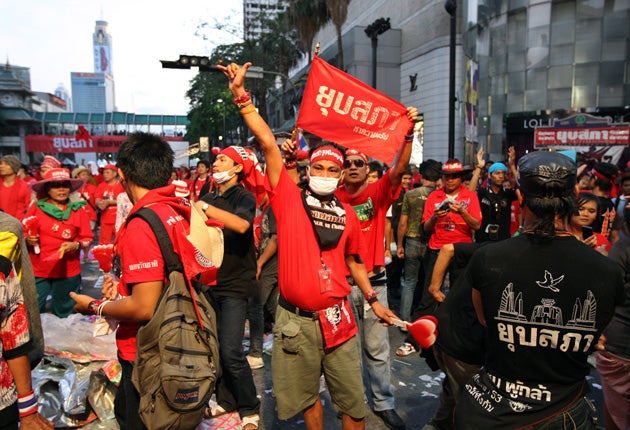Troops move in as Bangkok readies itself for conflict
Tense stand-off with red-shirt protesters as soldiers replace police on streets of Thai capital

Tensions continued to rise in the Thai capital yesterday as chanting, red-shirted protesters confronted armed troops at a busy road junction in the centre of the city.
Like so much else about this conflict, it is a surreal sight. Traffic bustles along normally, while on each side of the Silom Road junction, a commercial and shopping district, two violently opposed groups gather menacingly.
The Red Shirts, many of whom support the ousted prime minister Thaksin Shinawatra, have vowed to march to Silom Road and the headquarters of Bangkok Bank, defying an emergency decree. They want the Prime Minister, Abhisit Vejjajiva, to step down and call fresh elections.
They are targeting the Bangkok Bank because one of its advisers is Prem Tinsulanonda, a former army chief and prime minister and the top aide to Thailand's adored King Bhumibol Adulyadej.
Troops are occupying a bridge over the Silom Road, which is protected by razor wire and barricades. Protesters are lifting paving stones, presumably to use as missiles. The Red Shirts have also stockpiled sharpened poles and clubs and riot shields snatched during the violence last week, which saw 25 killed and 900 injured and prompted fears of civil war.
From the bridge over the Silom Road, the troops have a perfect vantage point for picking off what they describe as the "terrorists" within the Red Shirt camp – the hardcore group that is orchestrating violent efforts from within the largely peaceable group.
"The situation is serious. Everyone says the army will do something now. The Red Shirt leaders have told everyone not to cross the Silom Road intersection. If they do try ... the army will come from all four sides," said one Red Shirt protester called Kris.
"We just want our country back, she said. "The government only cares about business. We're here to protest, not to practice meditation, but they've already killed many people. They say we are terrorists but everyone has the right to a future."
Mr Abhisit made the army chief General Anupong Paochinda head of national security late last week, replacing a deputy prime minister, effectively admitting that efforts to keep a lid on five weeks of protest have failed.
The military has stepped up its rhetoric since it was given more power to resolve the situation. The army says the protests have played havoc with the Thai economy and the country's international reputation. It is time for the demonstrations to end, and if that means clashes with the protesters, then so be it.
Mr Thaksin's ruling party was dissolved for alleged electoral fraud, paving the way for Mr Abhisit's coalition to take power after a parliamentary vote that the Red Shirts say was influenced heavily by the military. Mr Thaksin has urged the Prime Minister to call a snap election.
Riot police have largely been removed from the streets. There is a feeling that the police, who are working class Thais just like many of the Red Shirts, sympathise with the protesters.
However, the Red Shirts say they also have support within the army from so-called "watermelon soldiers" – green on the outside but red inside. Many of the Red Shirts come from the poor north-east of the country, Mr Thaksin's fiefdom. Many, however, are from Bangkok and insist that the demonstrations are now about much more than bringing back Mr Thaksin.
At the front lines at Silom Road, there is an almost party atmosphere, with many women and children in evidence, not just young men with sticks. The protesters have built an enormous tent city.
Join our commenting forum
Join thought-provoking conversations, follow other Independent readers and see their replies
Comments
Bookmark popover
Removed from bookmarks